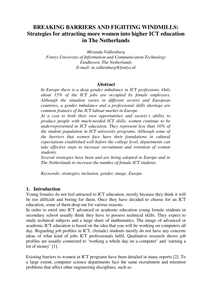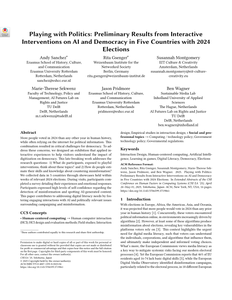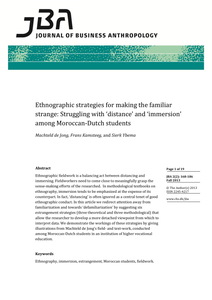Skyler White is a protagonist in the top-ranking television series Breaking Bad. She is also one of the most hated characters on television. This paper focuses on how the character of Skyler and Anna Gunn – the actor that plays her – are turned into a ‘composite celebrity’ in audience discussions. This is achieved by analysing threads on the social news website Reddit that specifically discuss Skyler. We discovered three main speaking positions: ‘savvy’ viewing; moral realism; and public shaming. This type of audience research may help further discussion on how celebrity culture is supported by neoliberal changes in the public sphere and caught up in the devaluation of professionalism and professional status – which, as will be shown, has especially dire consequences for professional women. Breaking Bad showcases predominantly masculine narratives. The derogation of its key female character therefore does not come as a surprise. However, a feminist defence of both the character and the actor – although a minority perspective – is also voiced. This article reveals how the interlinking fields of celebrity gossip and television criticism are a space of vibrant and sometimes frightening discussion in which a neo-conservative gender agenda is simultaneously asserted and contested
LINK
At this critical moment in time, April 2020, when we are living with the cataclysmic event of Covid-19, television – a medium declared almost dead at the beginning of this millennium – has become a vital resource for solace, daydreaming, social ritual, knowledge and storytelling. In conditions of lockdown, we turn towards television, not away from it (Ellis, 2020; Negra, 2020). We are checking news on national channels, and tuning to live broadcasting for campaigns to help the health services and communities in need, such as with the globally broadcast One World: Together At Home special. We are curling up on the sofa to engage with gripping drama, like Ozark streaming on Netflix, re-watching favourite series from the beginning, such as Buffy or Breaking Bad, and taking part in television quiz shows like Pointless, even watching repeats, to recreate a pub quiz atmosphere in the living room. On a darker note, we are also overloaded with corona news; the ritual evening news bulletin can be a source of anxiety and a cause of sleeplessness. Television infrastructure can break down, from broken satellite dishes to lost remote controls, which are tricky to fix when technicians are not so readily available to help; and television can be an economic burden. The cost of streaming Breaking Bad can push the limits of monthly contracts and data packages. Television both lightens and darkens the mood of domestic spaces and social relations in lockdown culture.
MULTIFILE

In Europe there is a deep gender imbalance in ICT professions. Only about 15% of the ICT jobs are occupied by female employees. Although the situation varies in different sectors and European countries, a gender imbalance and a professional skills shortage are common features of the ICT labour market in Europe. At a cost to both their own opportunities and society's ability to produce people with much-needed ICT skills, women continue to be underrepresented in ICT education. They represent less than 10% of the student population in ICT university programs. Although some of the barriers that women face have their foundations in cultural expectations established well before the college level, departments can take effective steps to increase recruitment and retention of women students. Several strategies have been and are being adopted in Europe and in The Netherlands to increase the number of female ICT students.
DOCUMENT

Research on follow-up outcomes of systemic interventions for family members with an intellectual disability is scarce. In this study, short-term and long-term follow-up outcomes of multisystemic therapy for adolescents with antisocial or delinquent behaviour and an intellectual disability (MST-ID) are reported. In addition, the role of parental intellectual disability was examined. Outcomes of 55 families who had received MST-ID were assessed at the end of treatment and at 6-month, 12-month and 18-month follow-up. Parental intellectual disability was used as a predictor of treatment outcomes. Missing data were handled using multiple imputation. Rule-breaking behaviour of adolescents declined during treatment and stabilized until 18 months post-treatment. The presence or absence of parental intellectual disability did not predict treatment outcomes. This study was the first to report long-term outcomes of MST-ID. The intervention achieved similar results in families with and without parents with an intellectual disability.
DOCUMENT

More people voted in 2024 than any other year in human history, while often relying on the internet for political information. This combination resulted in critical challenges for democracy. To address these concerns, we designed an exhibition that applied interactive experiences to help visitors understand the impact of digitization on democracy. This late-breaking work addresses the research questions: 1) What do participants, exposed to playful interventions, think about these topics? and 2) How do people estimate their skills and knowledge about countering misinformation? We collected data in 5 countries through showcases held within weeks of relevant 2024 elections. During visits, participants completed a survey detailing their experiences and emotional responses. Participants expressed high levels of self-confidence regarding the detection of misinformation and spotting AI-generated content. This paper contributes to addressing digital literacy needs by fostering engaging interactions with AI and politically relevant issues surrounding campaigning and misinformation.
MULTIFILE

Inaugural address of Frederike Praasterink, Professor Future Food Systems 22 February 2018. Three important principles contribute to the transformation of food systems: - Redesign food systems from ‘less bad’ to ‘net positive’ - Reconnect consumers, producers, youth - Revalue food through true cost accounting and new business models
DOCUMENT

The range of studies that has been conducted on the role of gossip in organizations suggests that gossip in the workplace plays a variety of important roles in organisational processes. However, relatively few studies have explored its role in intercultural situations. This is surprising given how organisations are becoming increasingly diverse. This paper addresses this gap in the literature. It reports on an exploratory project that sought to determine how perceptions of organisational gossip vary between members of different cultural groups. Using a sensemaking, interpretative approach, we showed two gossip scenarios to 8 Chinese, 8 German and 8 Dutch first year students, and conducted semi structured interviews, asking them how they perceived the nature of the gossip, the gossiper and the object of gossip (i.e., the person being gossiped about). After analysing the data with ATLAS.ti, we observed certain patterns emerging. For example, while all students condemned a manager’s bad behaviour, the Chinese students seemed to expect it more than did their Dutch or German counterparts. Moreover, we found that the relationship and amount of trust that exists between gossiper, listener and object of gossip greatly influenced how the gossiper and object of gossip were perceived. After reflecting on our research methodology, this study sets the stage for the next phase of our research on the role of gossip in intercultural situations. LinkedIn: https://www.linkedin.com/in/dominiquedarmon/
DOCUMENT

With an increasingly ageing population there will be a rising demand for palliative care, including from older migrants and ethnic minorities. While many (future) physicians are unfamiliar with specific needs of older migrants and ethnic minorities regarding care and communication in palliative care, this may be challenging for them to deal with. Moreover, even many medical teachers also feel unprepared to teach palliative care and culturally sensitive communication to students. In order to support medical teachers, we suggest twelve tips to teach culturally sensitive palliative care to guide the development and implementation of teaching this topic to medical students. Drawn from literature and our own experiences as teachers, these twelve tips provide practical guidance to both teachers and curriculum designers when designing and implementing education about culturally sensitive palliative care.
MULTIFILE

Ethnographic fieldwork is a balancing act between distancing and immersing. Fieldworkers need to come close to meaningfully grasp the sense-making efforts of the researched. In methodological textbooks on ethnography, immersion tends to be emphasized at the expense of its counterpart. In fact, ‘distancing’ is often ignored as a central tenet of good ethnographic conduct. In this article we redirect attention away from familiarization and towards ‘defamiliarization’ by suggesting six estrangement strategies (three theoretical and three methodological) that allow the researcher to develop a more detached viewpoint from which to interpret data. We demonstrate the workings of these strategies by giving illustrations from Machteld de Jong’s field- and text-work, conducted among Moroccan-Dutch students in an institution of higher vocational education.
DOCUMENT

Schepen in moeilijkheden op zee leveren vaak besluitvormingsproblemen op tussen de scheepseigenaar/kapitein en de kuststaat. Kuststaten en met name de lokale overheden willen een probleem schip graag zo ver mogelijk weg sturen van hun gebied terwijl de eigenaar/kapitein zijn schip graag zo snel mogelijk naar de kust, een beschutte locatie of haven wil brengen. Het onderzoek geeft onderbouwing voor de besluitvorming rond schepen in moeilijkheden, zowel voor de zeescheepvaart als de betrokken besluitvormers van oeverstaten. Het product van het project is: een, op uitgewerkte scenario’s per scheepstype en lading gebaseerde besluitvormingsprocedure voor zeeschepen in moeilijkheden
DOCUMENT
